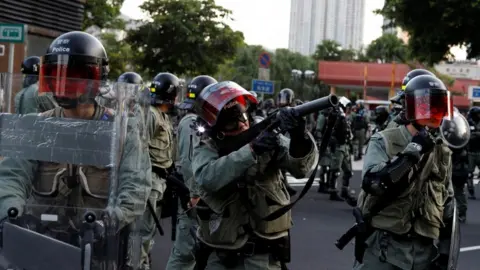Hong Kong protests: China flag desecrated as fresh unrest erupts
Activists in Hong Kong have desecrated a Chinese flag and vandalised a shopping centre on the 16th straight weekend of anti-government protests.
Escalators and glass panels were targeted at the New Town Plaza in Sha Tin. Police have closed it and fired tear gas at brick-throwing protesters.
Police earlier prevented major unrest on the airport metro system.
The protests were sparked by a now-withdrawn extradition bill but morphed into a wider pro-democracy campaign.
Issues such as universal suffrage, a demand for an inquiry into police actions and the alleged involvement of gangs in countering the protests have come to the fore.
- Summary of the protests in 100 or 500 words
- All the context you need on the protests
- Timeline of events so far
The campaign, mostly conducted by young people, was peaceful to start with but has become increasingly violent.
The unrest has become the biggest challenge to China's rule since Hong Kong's sovereignty was handed back by Britain in 1997.
Hong Kong is part of China, but enjoys "special freedoms". Those are set to expire in 2047, and many in Hong Kong don't want to become "another Chinese city".

Why vandalism is on the rise
By Stephen McDonell, BBC China correspondent, Hong Kong
The damage to Sha Tin shopping centre and train station shows the huge gulf that has opened up in this city, between different parts of the community and what they think is morally justifiable.
A senior police officer told journalists here last week that he could not believe how so many young people now thought it was acceptable to break the law if a cause was right.
The mostly young, hardcore activists who destroyed ticket machines and now routinely vandalise train stations say they cannot see how it is acceptable for the train network operator to collude with the authorities by shutting down services in areas where protests are planned. Therefore, they argue, the stations are legitimate targets.
They also say that two months ago the shopping centre at Sha Tin allowed police in to grab activists so it, too, is a legitimate target for vandalism.
Police cannot understand why so many ordinary citizens are abusing them. Those ordinary citizens, in turn, say they cannot understand why the police have turned violent.
The longer this crisis continues, the deeper these voids are becoming.

What happened on Sunday?
The unsanctioned rally at the New Town Plaza started on a small scale and peacefully.
Video footage then showed a Chinese flag being trampled by protesters before being carried out and thrown into a river.
 Reuters
ReutersMasked protesters used fire extinguishers to smash the glass of information maps, then sprayed water and threw rubbish bins down escalators. Pro-mainland businesses were reportedly targeted.
Riot police closed down the mall and the linked metro station in Sha Tin, a city in the New Territories north of Hong Kong Island.
Outside, protesters started ripping up pavement bricks and throwing them at police, who fired tear gas in response.
A barricade was set on fire elsewhere in Sha Tin.
The luxury Elements shopping centre in Kowloon was also closed as police and protesters squared off, the South China Morning Post reported.
What of the airport protest?
Protester groups online had called for a "stress test" of the airport on Sunday. The airport has become one of the high-profile targets of protesters.
But police stepped up security and authorities reduced transport links to head off possible unrest.
The Airport Express metro link was open only to passengers boarding at Hong Kong island.
Only people with flight tickets could board.

More on the Hong Kong protests:
- How is Hong Kong run? and what is the Basic Law?
- The background to the protests in video
- A visual guide to how one peaceful protest turned violent

What's the background?
Protests began in June in opposition to a proposed bill that would have made it possible for people in Hong Kong to be extradited to mainland China.
Critics said they could have faced human rights abuses.
The bill was initially shelved, and later withdrawn completely, but this has failed to quell the protesters' anger.
Their demands have been rejected by both Beijing and Hong Kong's Chief Executive Carrie Lam, who on Sunday again vowed to stop the violence.
